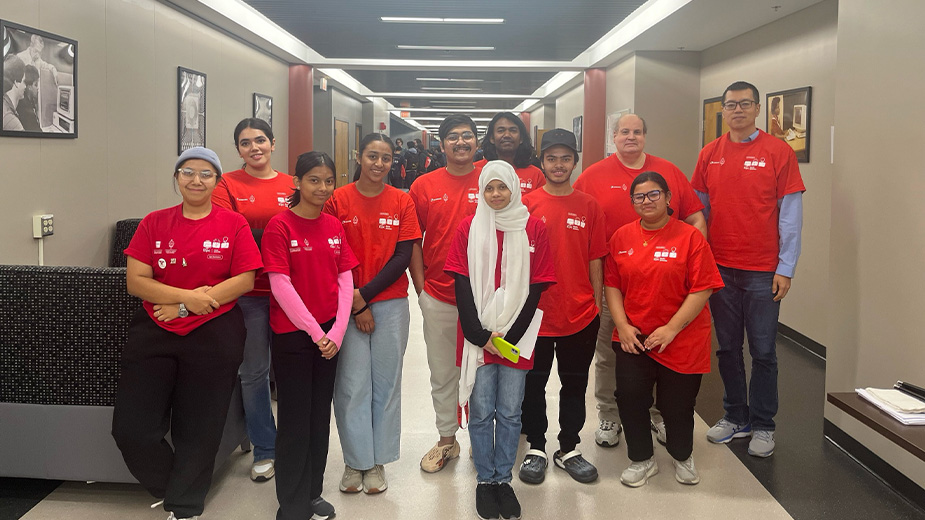YSU Faculty Union Alarmed at 3 State Budget Items
YOUNGSTOWN, Ohio – The budget the Ohio House of Representatives has sent the Senate contains at least three provisions the faculty at public universities believe attack their integrity as professionals.
One would require that those who assign textbooks to their students file annual financial disclosure forms and pay a $35 fee to defray the expense of processing the statements. Failure to do so could result in a $250 fine.
A second would require tenured faculty to undergo a review of their pedagogy and research at least once every five years. Those who don’t pass the scrutiny of their university administration could be fired.
And a third would cap faculty sick days at 10 per year.
The president of the Youngstown State University chapter of the Ohio Education Association and two state representatives held a press conference Monday at YSU to warn of the possibility the Senate would keep the provisions and return the budget — House Bill 49 — to the House before Gov. John Kasich signs it. June 30 is the deadline to pass the next biennial budget.
President of the YSU-OEA is economic professor A.J. Sumell and the state legislators were Michele Lepore-Hagan, D-58 Youngstown and John Boccieri, D-59 Poland.
Lepore-Hagan assessed the chances of the provisions surviving the Senate intact as “good.”
She said she voted against the House draft of the budget because it is “anti-education, anti-woman and anti-collective bargaining.” She described the measure as “a sneak attack that would bring back Senate Bill 5,” the anti-public sector union measure Ohio voters rejected overwhelmingly in November 2011.
Sumell was more diplomatic, allowing that the Republican members of the House “have good intentions.” But he agreed with Lepore-Hagan’s statement that the provisions “are a solution in search of a problem.”
As for post-tenure review, Sumell noted that YSU reviews the research and teaching of tenured faculty at least once every two years and many of them annually.
“This is an assault on academic freedom,” the YSU-OEA president declared.
As for the financial disclosure forms, “This will have no impact on the cost of textbooks,” he said, and the concern that faculty enjoy lucrative profits from textbooks they write and require in their classes is ill-informed. Most assigned textbooks must pass muster by a department committee, he said. Seldom do faculty get to unilaterally assign texts.
Boccieri said the three provisions in HB 49 are better left to collective bargaining and could result in “the export of the most talented faculty” to private colleges or to public universities in other states. No other state has such requirements, the representative said.
He called the provisions “an affront to education” and part of a Republican effort to “repeal protections for labor unions.”
Administrative staff and other tenured faculty complained at length to Lepore-Hagan and Boccieri about feeling unappreciated and the lack of respect for their efforts.
The adjunct professor who oversees the foreign languages lab iterated that limited service faculty have gone “decades” without a pay raise.
A female member of the administrative staff noted that it’s still women who are more likely to respond to sick children and care for elderly parents and use sick leave to do so.
When Youngstown University became YSU in 1967, Lepore-Hagan said, the state provided two-thirds of its operating budget. Today that’s less than a third.
A YSU spokesman said the state pays for 27.3% of the university’s fiscal 2018 budget. Fiscal 2018 begins July 1.
Philosophy professor Gabe Palmer-Fernandez said he cannot discuss with his students where they can buy the texts he assigns other than the university bookstore. He said the university’s exclusivity contract with Barnes & Noble Booksellers contains a “gag rule” that forbids him from so much as discussing less expensive sources to buy books. “It prohibits us from directing students to [stores or websites that offer] less expensive texts,” he said.
A university spokesman denied there is a “gag rule.”
Said Ron Cole, in an email to The Business Journal, “All of us at YSU are working hard to reduce the costs of textbooks. In fact, we have a program that makes available a limited number of textbooks in Maag Library free of charge. That said, we are excited about the opening later this summer of the new Barnes & Noble student bookstore on Fifth Avenue. B&N is one of the world’s largest and most respected booksellers and has a variety of proven programs to help students save money. Our hope is that everyone on campus would utilize B&N. It is in everyone’s best interest to help the store become a success.”
Pictured above: State Reps. John Boccieri, D-59 Poland, Michele Lepore-Hagan, D-58 Youngstown, and A.J. Sumell, president of the YSU-OEA and an economics professor.
Copyright 2024 The Business Journal, Youngstown, Ohio.



